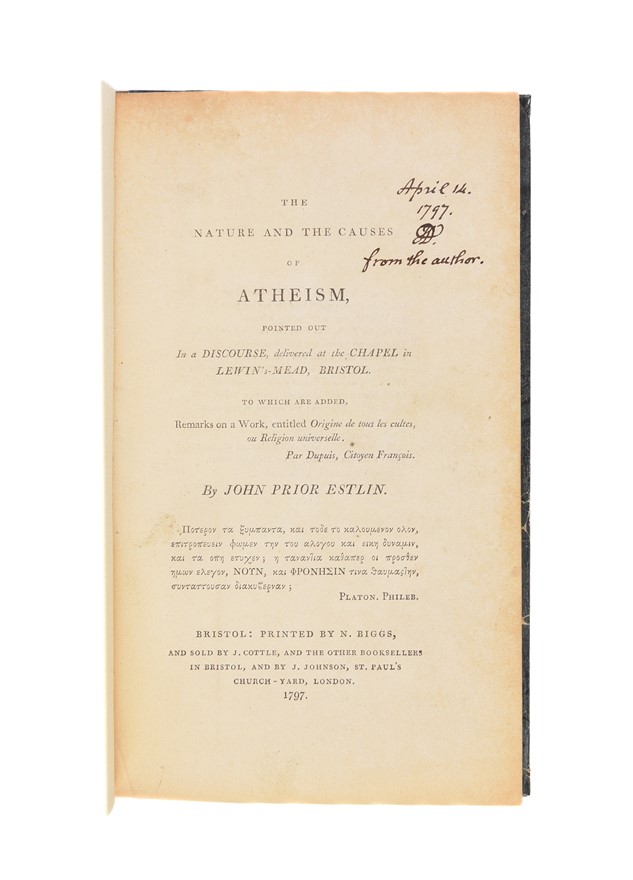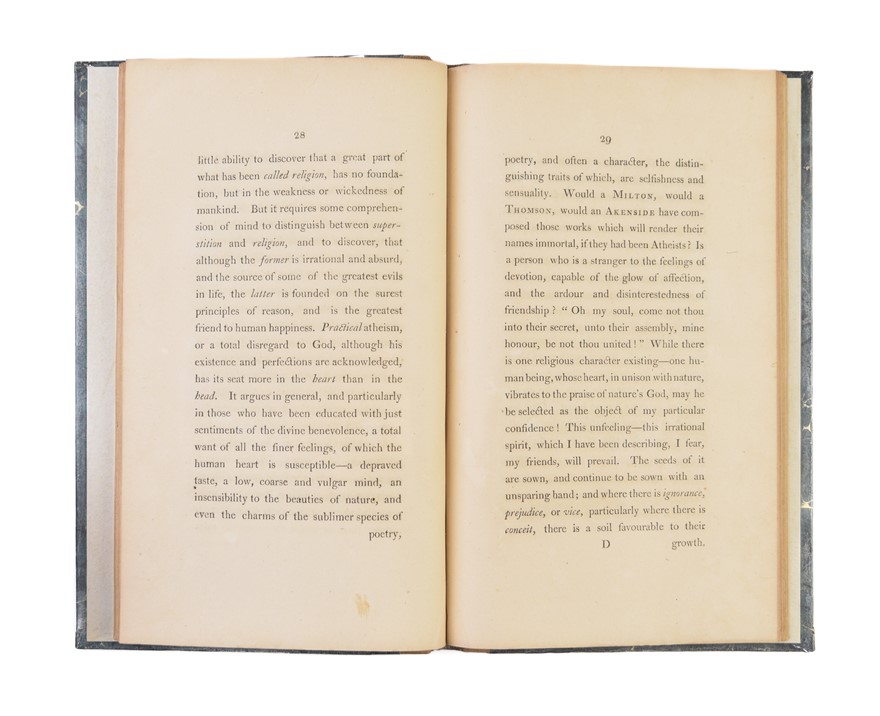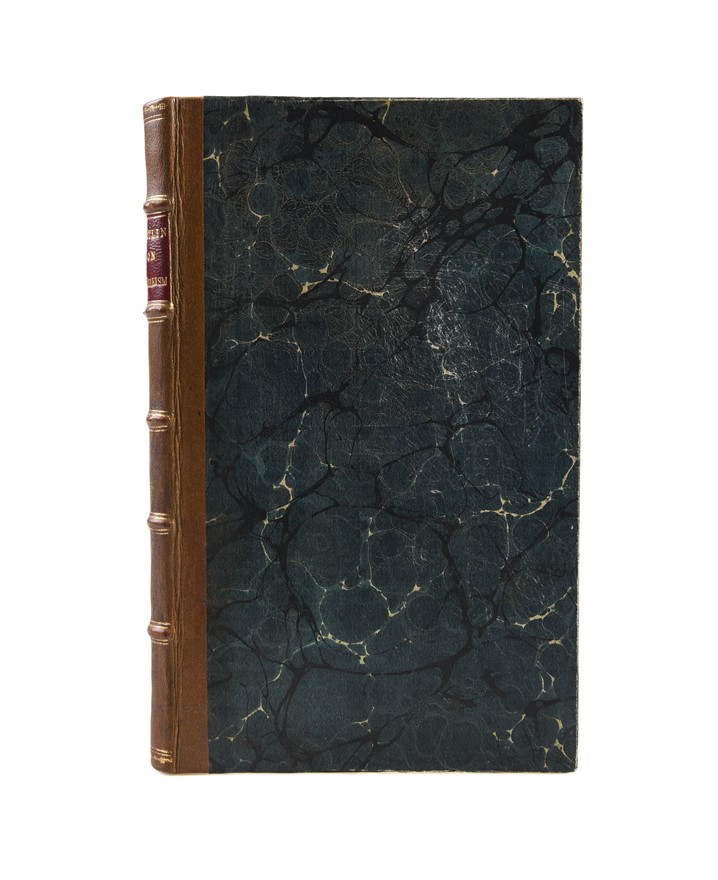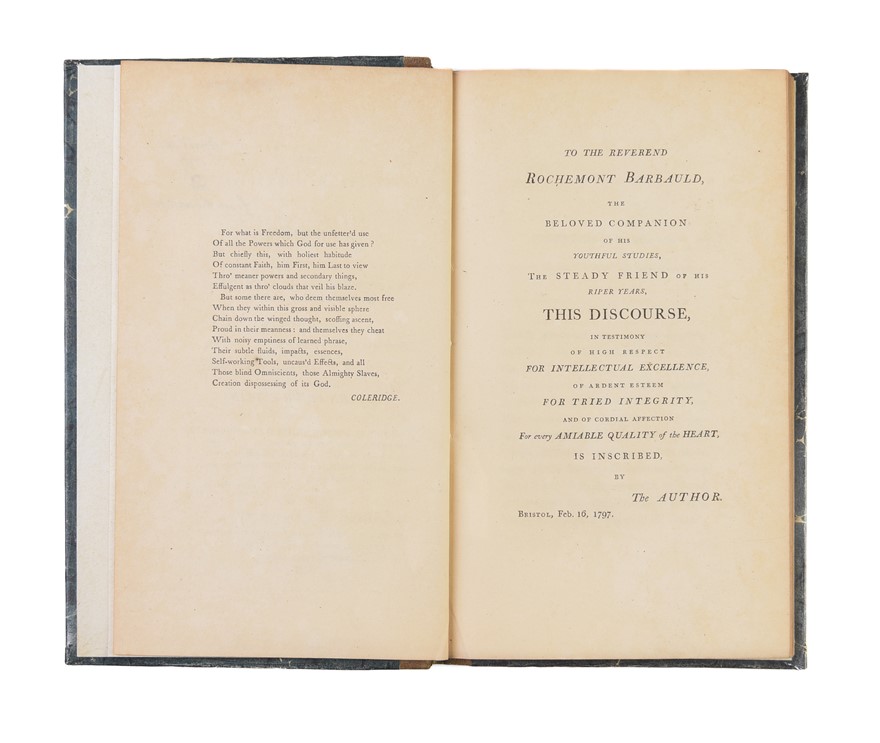The Nature and Causes of Atheism,
ESTLIN John Prior (1797.)
£2500.00 [First Edition]
WITH AN EARLY QUOTATION FROM COLERIDGE
pointed out in a Discourse, delivered at the Chapel in Lewin's-Mead, Bristol. To which are added, Remarks on a Work, entitled Origine de tous les cultes ou Religion universelle Par Dupuis, Citoyen François.
First Edition. 8vo (215 x 130mm). 85, [1] pp. Evenly browned throughout, mark in the inner margin of D2v-D3r where an old ribbon marker (now removed) has left a stain but otherwise a good copy on thick and large paper [see below]. Modern calf-backed marbled boards, leather spine label.
Bristol: by N. Biggs, and sold by J. Cottle...,
ESTC records Boston Athenaeum, Rutgers, Missouri, Toronto and Yale only in the USA. No copies recorded on Rare Book Hub. Inscribed in the upper fore-corner of the title-page "April 14. / 1797. / "JD" [i.e. Rev. John Disney] / from the author"
A presentation copy - on thick and large paper - of Estlin's argument against atheism. With quotations from poems by Estlin's friends, Samuel Taylor Coleridge and Anna Laetitia Barbauld.
John Prior Estlin (1747-1817) was a Unitarian minister and school teacher who settled in Bristol where he became associated with many of the most notable characters there at the end of the 18th century including Mrs Barbauld, Robert Southey and Samuel Taylor-Coleridge. Barbauld's poem "An Summer Evening's Meditation" is quoted from at the end of this work (and the work is dedicated to her husband) and on the verso of the title-page is an excerpt from Coleridge's "The Destiny of Nations" a section of which was first published in Southey's The Vision of the Maid of Orleans (1796). The complete version was included in Sibylline Leaves (1817).
Estlin questions the true definition of atheism before arguing that man requires "not merely a belief in the existence of God, but an internal relish for the pleasures of devotion", he continues:
"...those emotions of gratitude, love, reverence, and resignation, which are due to a Being of all possible perfection, who sustains the nearest relation to us, and upon whom we entirely depend for all which we hope to enjoy, both for time and for eternity. It is this sense which constitutes the sublime of character - which elevates man to the true dignity of his nature - which is the only permanent spring of every thing which is excellent and praise-worthy, and which imparts a kind and degree of happiness, which all the events of a fleeting, imperfect, and uncertain life can no affect" (p.23)
Estlin’s arguments about the “external senses” and the “reflexive or subsequent senses” and “the finer powers of perception in the human mind” that necessarily bind Mankind to a “veneration and love” of some Supreme Being (p. 21) almost seem to meet their antithesis in Percy Bysshe Shelley’s short and notorious pamphlet, The Necessity of Atheism (1811), which caused his expulsion from Oxford, in which he noted the absence of any absolute proofs for such senses. No connection between the two works seems to have been made.
Southey wrote to Estlin on the publication of this book:
"Your work will not in all probability be read by those who are decidedly Atheistical. they are in general self-satisfied, & no man likes to have his settled opinions shaken but it will fall into the hands of many whose scepticism inclines that way, & there I think & hope it will be useful..." (9th April 1797)
Southey also wrote to his publisher Joseph Cottle in May 1797 asking that the second edition of his Poems be printed on "large paper of the very best quality — like Estlins sermon" and later that he wished for a, "dozen copies upon large paper — such as the presentation copies of Estlins sermon"- the present copy is clearly one of those that Southey was referring to.
In 2013 Bonhams sold a pair of silver spoons given by Estlin as a present to Coleridge on his wedding to Sara Fricker in Bristol on 4th October 1797. The spoons are engraved "JPE to STC" and include Estlin's monogram (similar to the monogram on the title-page here).
Provenance: Presentation inscription by Estlin on the title-page to an unknown recipient. Later in the library of David Arthur Pailin, with his bookplate on the recent pastedown (with an acquisition date of February 1985)
Stock Code: 247313







